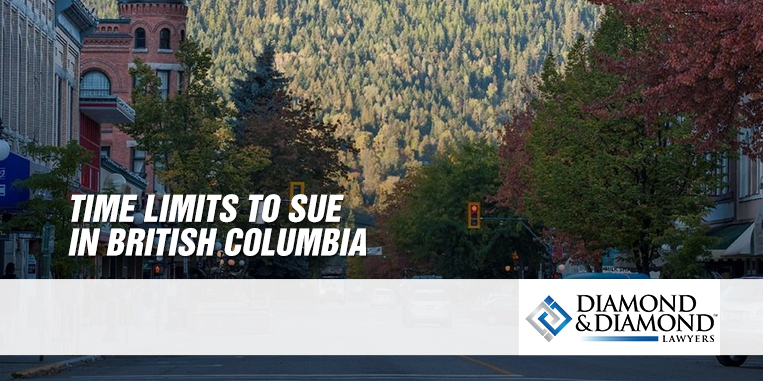Virtually every legal claim has a “time limit.” This limitation is designed so that those who are injured or harmed do not wait too long to assert their rights. Evidence can grow stale, and potential defendants do not want to live their entire lives in fear of being sued.
It is a good idea to speak to alawyer about your potential legal claim as soon as you can after an accident or injury. However, knowing about these time limits will help you decide if you can still take action if your injury arose some time ago.
Before you start thinking about deadlines for lawsuits, however, you should consider your options within the ICBC’s processes. Disputes can often be resolved at this stage, but you may need the help of a lawyer.
Asserting Your Claim with ICBC
You should contact ICBC as soon as you can after your accident to make a claim. You can receive compensation that will help you deal with lost wages, future care, pain and suffering, and other losses.
ICBC will typically offer you these benefits as a lump sum payment. As a result, you may want to wait until your medical condition has stabilised so you fully appreciate how much your recovery will or has affected your life.
If ICBC denies your claim or does not offer you what you would consider a fair settlement amount, you have a few options to consider. First, you can appeal the ICBC’s decision regarding fault, the settlement amount, denial of the claim, or its treatment of you during the application process. The ICBC also has a “Fairness Process,” that may also be available to you.
You may want to consider a lawsuit if any of the following situations occur:
- The ICBC refuses to pay you accident benefits or pays you less than what you think is reasonable.
- The ICBC refuses to pay damages or less than what you think is fair for your situation.
- The ICBC determines that you are either partially or completely at fault.
It is a good idea to get legal advice if any of these situations happen to you.
Deadlines to Bring Your Lawsuit
If you want to assert your claim in a formal lawsuit, you must file the appropriate paperwork within two years of the date of the accident. If you received no-fault benefits, then the “timer” starts as of your last date of benefit payments, not the accident date.
This time limitation does not begin until you “discover” your injury, which is usually the date of the accident for most personal injury cases. However, for cases like medical malpractice or cumulative trauma injuries, this timeframe may be harder to determine.
These deadlines do not apply if you were under the age of 19 at the time of the incident. Instead, the two-year time limitation does not start until you turn 19. If you received benefits, however, the two-year limitation begins as of the last date that you received benefits, not when you turn 19.
In addition, British Columbia recently enacted an additional limitation within the past few years. There is also an “ultimate limitation period,” that cuts off your rights to assert a claim after 15 years. This 15-year limitation applies regardless of when you “discover” your injury.
Suing in the Right Court
Once you determine that you want to sue, you need to pick which court will work best for your situation. If your claim is less than $25,000, Small Claims Court will likely be appropriate. However, evaluating your claim to determine what it is worth can be difficult, so it is a good idea to involve an experienced lawyer to help you with this process. Call Diamond and Diamonds 24/7 injury hotline at 1-800-567-HURT or visit our website to speak to someone now about your claim. Remember, delaying could cost you the right to compensation.
FAQ's
What is the statute of limitations in British Columbia?
Claims aren’t valid forever. No matter the issue in question, there are statutes of limitations limiting the admissibility of claims to some time frame. In British Columbia, the 2012 Limitation Act is the law of the land regarding statute of limitations. According to the law, the specific amount of time depends on the type of claim. However, for most claims, the basic time limit for filing a lawsuit extends to two years. The timer starts running from the moment the claim is discovered. However, if you received no-fault benefits, the timer starts from the date of the last payment.
How long can you legally be chased for debt in British Columbia?
Debt has a way of chasing you down seemingly forever. However, in British Columbia, there are legal limitations to how long you have to file a lawsuit over a debt. The limitation of debt liabilities is defined in BC by the Limitation Act of 2012. The act limits legal debt liabilities to two years. The timer starts on the date you incurred the debt, made the last payment towards it, or acknowledged it somehow. Not all debt is subject to the same limitations. Child and spousal support arrears, and civil claims with monetary judgments, are notable exceptions.
Should I get a lawyer to deal with ICBC?
That’s up to you. After an accident, you should start the process and contact ICBC as soon as possible to make a claim. If ICBC accepts your claim, you will receive a lump sum payment to help cover lost wages and medical care, among other things. However, if ICBC denies your claim, or offers an amount you find insufficient or unfair, seek legal counsel. A lawyer can advocate on your behalf if ICBC finds you partially or totally at fault. They can also help with insufficient payments on your claim benefits or damages.
